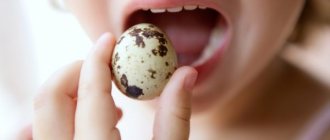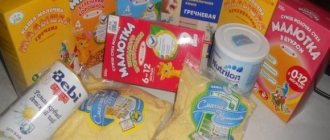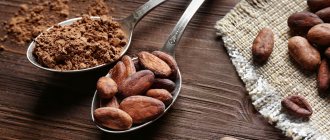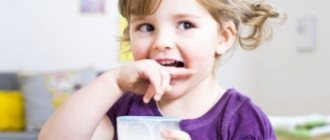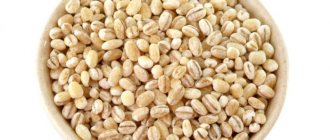At what age can children drink coffee?
The child's body is in the process of growth and formation, and its organs and systems are especially vulnerable to adverse influences.
Let's consider at what age children can be given coffee. Most doctors do not recommend drinking it to children under 14 years of age. This is explained by the fact that the teenager’s nervous system is already fully formed, the body works like an adult’s, metabolism is still fast and caffeine is easily broken down and eliminated in a short time.
IMPORTANT It is believed that a seven-year-old can drink one cup of milk per month if he has a strong desire to try the product. At 10 years old you can already have a small portion 3-4 times a month. At 12-14 years old, a teenager can take it twice a week. It's better if it comes with milk. It is difficult to control the child during this period, because cafes, coffee shops, product advertisements are found on every corner.
Can children drink coffee?
Coffee lovers who have children sooner or later begin to wonder whether this invigorating and aromatic drink can be consumed by a child, and how it affects the child’s body. Of course, adults are responsible for their own health, but children do not have such luxury. And parents or guardians are responsible for their well-being.
In this article we will talk about how children can drink coffee correctly and whether they can drink it at all. You will also learn about how the drink affects the well-being and condition of babies.
The effects of coffee on the body
Any food (including drinks) affects the physiological and chemical processes that occur in the body. And coffee is no exception to the rule.
Composition of coffee drink
To understand what effect a product has on the body, you first need to familiarize yourself with its composition.
- Of course, the main component of the most popular drink in the world is caffeine. It is this substance that charges the body with energy and gives a boost of vigor.
- It is also known that coffee beans contain components such as sucrose, vegetable protein, and fiber. It is noteworthy that coffee contains 10 times more plant fiber than caffeine. The grains also boast the presence of organic tannins. By the way, there are 3 times more tannins in aromatic beans than caffeine.
This is only part of the main components that coffee beans are rich in. After all, it is known that the product consists of more than a hundred ingredients. To date, the effect on the human body of about half of them has been studied. Therefore, it is difficult to say whether a coffee drink brings more benefit or harm to the body.
This is interesting: the caffeine content in the classic Arabica drink ranges from 0.7-2-5%. If we talk about Robusta, then the “dose” of caffeine in it varies from 1.5 to 3 percent.
It doesn’t hurt to remind readers that when coffee beans are roasted, the caffeine content increases by 10-20%. That is, the duration of heat treatment has a direct impact on the content of the caffeine component in the finished product.
How does caffeine affect the body?
You need to know that this substance:
- Suppresses drowsiness and relaxation. This is why concentration and reaction speed improves.
- When drinking a coffee drink, the production of adrenaline is stimulated. This hormone allows a person to feel cheerful and energetic. Thanks to this effect, the functioning of all systems and organs, including the brain, improves.
- Caffeine ensures the supply of glucose to the blood. It is known that the latter substance also provides a person with a surge of strength and provides him with a charge of vigor.
- By the way, many people note that after a cup of coffee their mood automatically lifts. The production (under the influence of caffeine) of a hormone such as dopamine is responsible for such a pleasant “side” effect.
This is how many positive impressions and effects a person can provide his body by drinking a cup of an invigorating and aromatic drink. For the most part, coffee drinks are not harmful to human health. Unless people who suffer from high blood pressure should be more careful with its use.
What is the problem
As a rule, it consists of a “dose” of your favorite drink. It is important to understand that in small doses caffeine is not dangerous, but on the contrary: it gives a person an excellent tonic effect and stimulates the functioning of all internal organs and systems of the body. But with excessive consumption of caffeine-containing drinks, the consequences may not be the best.
These include:
- sleep problems;
- changeable mood and increased irritability (due to an imbalance of the nervous system);
- dehydration of the body. This is especially true for people who drink large quantities of coffee and tea and forget about the existence of water. When drinking coffee, it is very important to drink at least one and a half liters of purified water per day.
You also need to add coffee addiction. Without a cup of coffee in the morning, a person becomes not himself, notes apathy and is in a bad mood.
Attention: it is recommended for an adult to consume no more than 2-3 cups of coffee drink daily. This is the “dose” that doctors consider safe for health. With such a volume of drink consumed, an adult does not need to worry about the possible consequences of attachment and love for coffee.
Harm of coffee to children's bodies
Everything that was said above applies exclusively to the consumption of coffee by adults. But for children, there are much more disadvantages of consuming the drink. In addition to insomnia, the following should be highlighted:
- The harm of coffee extends to the skeletal system. After all, this drink has a diuretic effect. But with every 100 mg of caffeine removed, the body loses 6 mg of calcium. It is worth noting that this mineral is vital for the child’s body. Later (in adulthood), excessive love of coffee can lead to osteoporosis. This also applies to teenage girls who consume coffee as a diuretic (for weight loss).
- When drinking coffee in large quantities, your precious child may develop irritability, hyperactivity and irritability.
- The drink suppresses hunger and reduces appetite. But a growing body requires adequate nutrition.
- Adrenaline, which gives adults vigor and a surge of strength, has a completely different effect on a child. The hormone “gives” children a rapid heartbeat, which in the future can lead to the development of diseases of the cardiovascular system of the body.
- Also, young teenage ladies should be careful with their coffee consumption. Scientists have proven that teenagers' excessive love for caffeine-containing drinks can cause difficult pregnancies and protracted labor in the future.
- The product increases blood sugar levels, which is completely undesirable for children.
- Drinking coffee on a regular basis has an adverse effect on the functioning of the hormonal system.
- Coffee contains acids, so regular intake of invigorating and aromatic liquid has an adverse effect on the condition and formation of teeth.
- Frequent consumption of coffee in childhood is not very beneficial for the health of the gastrointestinal tract.
Attention: the main danger is that it is difficult to find an acceptable, safe dose for a constantly growing and developing organism. In addition, peers of all age groups show significant differences in both the rate of weight gain and other physiological changes.
At what age are children allowed to drink coffee?
Let's go through the main children's categories:
- The youngest (children under 5 years old) should absolutely not drink coffee. Their drinking diet should consist of fortified fruit drinks and herbal tea. If the child does not have allergies, then you can offer him a healthier and safer alternative for the body - hot cocoa.
- Children aged 7 years and older can already be given coffee to drink occasionally. But it’s better to limit yourself to once a month. The rest of the time, offer teas or chicory, which is beneficial for a growing child.
- Starting from 12-13 years old, the number of cups of coffee consumed by a teenager can be increased to 2-3 per month. During this period, the load on the child is quite large, so the excessive effect of caffeine on the nervous system will not benefit the child at all. During this age period, it is advisable for the child to drink mint tea and drinks based on medicinal herbs. Mild tea with lemon and sugar will also be helpful. And during school days and the winter season, it is recommended to add rosehip infusion to a teenager’s drinking ration. It is rich in vitamin C, which is why it will greatly benefit the body's immune system.
- Doctors are inclined to believe that the ideal time to introduce coffee into a child’s diet is the age of 14-15 years. At this time, the body has already adapted a little to pubertal changes, the nervous system has become stronger. If the child does not have heart problems, then you can allow him to drink one cup of coffee 2-3 times a week. If he doesn’t show any particular love for the coffee drink, then it is not at all necessary to lure him “to the side of evil.”
Coffee in children's lives: questions and answers
Here we have collected the most popular questions from parents about coffee, and we will try to answer them from a medical point of view.
- I give my son a coffee drink with milk in the morning to help him wake up quickly.
Answer: Yes, of course, many parents give their sons and daughters coffee in the morning to help their bodies wake up as quickly as possible. But you still need to know that for these purposes there are drinks that are healthier for a growing body. For example, green tea with lemon (it also contains caffeine), cocoa or hot chocolate. Especially the last two options for delicacies are relevant during the autumn and winter cold.
Also, a little physical activity helps a child (as well as adults) wake up in the morning. We recommend doing morning exercises with your child rather than drinking coffee at a common table.
- It is known that natural coffee contains the highest dose of caffeine. In this case, can the child be given an instant drink?
It is true that natural coffee beans are stronger than other types of product. However, you definitely shouldn’t give an instant drink to a child. The fact is that it is created chemically, so it can negatively affect the condition of internal organs (especially the pancreas and the stomach itself). It is noteworthy that this applies even to a drink consumed in small doses.
It should be noted that drinking instant coffee leads to an increase in pathologies and diseases of the gastrointestinal tract. Therefore, it is not recommended to drink instant drinks for either adults or children.
Is it okay for my child to drink decaffeinated coffee?
You need to understand that natural coffee beans contain caffeine by default. Therefore, in order to deprive the raw material of this component, it is treated with special chemical compounds. Some contain benzene, a component that has carcinogenic properties. Ethyl acetate, in turn, is used as a solvent because its formula contains a large proportion of acetic acid. Of course, there are more gentle methods to “remove” caffeine from natural beans. But when buying a product in a store, you cannot be sure what technology was used to process organic raw materials.
There is also a natural variety of decaffeinated coffee. But it contains another substance called theombromine. This component, like caffeine, belongs to the group of alkaloids. Therefore, the principle of influence on the body is not particularly different. In particular, this concerns the frequency of contraction of the heart muscle.
It must be said that it is not yet possible to completely remove caffeine from beans. Of course, due to such nuclear impact, its share decreases significantly, but still does not go to zero. You need to know that coffee beans labeled as decaffeinated contain between 0.1 and 1 percent of the active ingredient.
A few recommendations:
- If you give your child a coffee-based milk drink (many children like a sweet cappuccino or latte), remember that the child may well have an intolerance. This disease affects about 15-16% of children worldwide. If the child’s body normally accepts coffee in this form, then you can safely add milk or cream to his drink. After all, dairy products slightly reduce the harmful effects of caffeine on the body. Therefore, teenagers can be allowed to drink coffee half diluted with cream or milk.
- Green coffee is often advertised by manufacturers. But you shouldn’t buy into the hype about its benefits and beneficial effects on the body and treat your child to it. It is known that unroasted natural grains have a much stronger detrimental effect on the state of the child’s central nervous system than the classic version of the drink adored by many.
Attention: Never give coffee to a child with neurological problems. This may lead to seizures.
- After you first introduced your child to a new drink, we advise you to monitor the child’s condition and well-being. If you experience symptoms such as a burning sensation in the chest, trembling limbs, pale skin or a headache, give up coffee for your child in favor of green tea.
Important: coffee is strictly prohibited for a newborn or infant. Therefore, those mothers who breastfeed their children should exclude any type of coffee drinks from their diet.
So, let’s summarize which children should not drink coffee. These include guys who suffer:
- diseases of the cardiovascular system;
- in the presence of ailments of the gastrointestinal tract;
- if you have vision problems;
- for insomnia, nervous and neurological disorders;
- if you have kidney disease;
- if the child has a poor appetite.
Each parent decides independently whether to give their child a coffee drink. Even if you decide to introduce coffee into your child’s drinking diet, its portions should be very small. And, of course, you should not treat your child to a drink too often.
Can children drink coffee?
Number of votes: 110 3
5
1
110
Was the information helpful? Rate and leave a comment? Better yet, share!
Comments
We will be glad if you share your opinion or add to a note or article.
What are the benefits of coffee for children?
The drink contains vitamins and minerals that can have a beneficial effect on the well-being of children. They will help strengthen the immune system and also speed up metabolic processes.
It should be remembered that properly prepared high-quality drink has the following positive effects:
- improves blood circulation in the brain;
- helps to cheer up and improve mood;
- enhances attention and concentration;
- relieves fatigue;
- increases adrenaline, thereby increasing vigor and endurance;
- protects the body from radiation radiation.
What do we know about the benefits of coffee?
Coffee is a specific product that is actively in demand and popular all over the world. Its miraculous properties can increase motor and brain activity. It also saturates the body with a number of useful microelements and vitamins A, B, D.
Coffee can be quite beneficial for a child, since it contains iodine, calcium, and magnesium, which take an active part in the development and growth of the baby. But does coffee have as beneficial an effect as it does for an adult body?
Real beans and properly prepared coffee have the following beneficial properties:
- improves blood circulation;
- improves brain function;
- has an energetic effect;
- speeds up the awakening process;
- increases attention and concentration;
- facilitates memorization;
- reduces fatigue;
- physically stimulates;
- improves mood;
- allows the stomach and intestines to work better;
- protects the body from harmful environmental influences due to its high content of antioxidants;
- reduces the harmfulness of radiation exposure;
- affects the area of the brain responsible for breathing. Thanks to this effect, coffee alleviates asthma;
- improves mood and improves well-being.
But overuse of coffee leads to the fact that all the positive qualities lose their properties and the drink becomes more harmful than beneficial. If you allow a child to abuse coffee in large quantities, catastrophic consequences can occur, manifested in insomnia and periodic tachycardia.
Children and coffee: how to give the drink correctly and at what age is it allowed to drink it?
The optimal age to allow your child to drink coffee regularly is 14-16 years old, 1-2 cups of coffee per day. At this age, the body is strong enough and already formed to normally absorb caffeine without potential harm.
If a child demands to drink coffee, then you can be allowed to drink no more than 1 cup per day, starting from the age of 10. In this case, the strength of the drink should be kept to a minimum. If possible, it is necessary to dilute coffee with milk (1 to 1), cream, and condensed milk. Parents who fundamentally do not want to give their baby coffee can use cocoa.
How to start giving coffee? If a child expresses a desire to try a drink from your mug, then do not refuse him. Make sure there is enough sugar in the drink. Often, after the first try, children are dissatisfied with the taste of the drink and simply refuse it, since the coffee turns out to be overly bitter.
What coffee should I avoid?
- You should not start testing with instant coffee. It is not suitable for use by children. For adults, it also does not provide any benefit, since it is made on a synthetic basis and contains virtually no substances beneficial to the body. Compared to a drink made from grains, it lacks useful substances: acids and vitamins. Instant coffee is simply a cheaper product that can only invigorate you for a short time and drive away drowsiness. The composition is not enriched with vitamins. Powdered, granulated varieties of coffee are of purely unnatural origin and contain absolutely no useful microelements and minerals.
- It is also advisable to exclude decaffeinated coffee . This type of “coffee” can cause the most unpredictable reactions in the body, ranging from allergic reactions to disorders of the gastrointestinal tract.
- Instant coffee bags are low quality caffeine-containing powder. This drink is dominated by dyes and preservatives with a small content of tonic. With regular consumption of such coffee, a child may develop various stomach and dental problems.
What harm does coffee cause to a child?
Doctors prohibit frequent use of the product. This can have a negative impact on a child's fragile body. Among the negative consequences are the following:
- high-dose instant coffee removes calcium from the body, an important mineral for the growth and strengthening of the body;
- the product negatively affects hormonal levels, which is dangerous during puberty;
- it stimulates the pleasure centers of the brain, which leads to the search for stronger stimuli, for example, drugs, smoking or alcohol;
- under the influence of adrenaline, the heart rhythm is disrupted, which leads to malfunctions of the cardiovascular system;
- the drink is harmful to children with hypertension, because it increases blood pressure;
- the product significantly increases blood sugar levels, the pancreas suffers from this and diabetes mellitus can develop.
It can be concluded that it is potentially harmful to children. Do not rush to introduce this product. It is better to wait and postpone its use until older age.
Drink harm to baby
Doctors contraindicate frequent consumption of products containing caffeine, especially for children. It is advisable to know not only at what age coffee can be consumed, but also the negative consequences of the drink, which:
- adversely affects hormonal levels during puberty;
- increases adrenaline, causing heart rhythm disturbances;
- increases blood pressure, which is dangerous for hypertensive patients;
- raises sugar, which has a detrimental effect on the pancreas;
- removes useful substances from the body in large quantities.
So can a child have coffee? Despite the danger for a fragile body, one should not draw hasty conclusions. The main thing is not to accustom your child to the drink from an early age or give decaffeinated coffee, which can be drunk by children from 6-7 years old.
What kind of coffee can a child drink?
There are many types of this product. Before allowing it to children, it is necessary to decide whether children can drink this drink and how to calculate the permissible amount, whether it is worth adding milk and many other nuances.
Natural
The healthiest natural caffeine drink. It contains natural antioxidants and microelements. It is better to brew this drink with a coffee maker with milk to restore the calcium balance. Natural coffee can be drunk infrequently from the age of 7.
Soluble
The drink is harmful even for adults. The reason is as follows: it contains a lot of dyes, stabilizers, and solvents. Up to 10 years of age, instant drinks can cause allergies. You can drink it from the age of 12, in extreme cases.
In 3 in 1 bags
This type also contains many chemical components and huge amounts of sugar. It’s better to prepare it at home with cream and sugar than to drink 3-in-1 packets. You should drink it only in emergencies, when you need to cheer yourself up, but there is no natural one.
Cafein free
Many people consider this drink harmless, because there is no caffeine. This is a misconception, because Strong solvents are used to extract caffeine, and some may remain. It is also better to avoid this type.
Which coffee is contraindicated for children?
So how old can children have coffee? Here you need to build on the quality of the drink. Parents always try to give the best to their child. Therefore, you should not start with instant coffee. It is made from synthetic components, so the content of substances beneficial to health is minimal. Compared to natural grains, it does not contain vitamins, acids or microelements. Its use is not beneficial even for adults.
Instant coffee is a cheaper version of the natural product. It gives a short-term effect of vivacity and an influx of strength. It does not contain vitamins or other beneficial components. Powder and granules are obtained artificially, not naturally. Therefore, we are not talking about the benefits of such a drink and it is pointless to figure out at what age children can give coffee.
How much coffee can you give to children?
Experts say that if your baby wants to try your coffee, give him a sip from your cup, but put very little sugar or milk in it so that he doesn't like the taste at all.
ATTENTION The upper limit for introducing this drink is 16-17 years old. It is allowed to take 50 ml once a month from 6-7 years of age. From 10 years old you can drink 100 ml 2-3 times a month. You can regularly consume 1-2 cups per day from 14-16 years of age. At this age, the body is already physically stronger and caffeine will not cause much harm.
However, there is a condition that it should not be strong. And regularity should be acquired gradually.
What kind of coffee should I make for a teenager?
For a child over 14-15 years old, one cup of coffee per week will not cause harm. To instill good taste in your teenager, prepare him a drink from selected grains in crystal clear water - tap water is not suitable. Tell us what coffee you shouldn't buy.
For excellent taste and unsurpassed aroma, ground coffee must be poured with cold water, which meets certain characteristics for:
- rigidity;
- the amount of mineral impurities;
- transparency;
- smell.
Brew the drink for 3-4 minutes, but no more than 6 minutes. If you continue to prepare the drink, the drink will turn out to be too strong, with a bitter aftertaste.
Modern three-stage water purification filters allow you to get rid of all unnecessary impurities, bacteria, and pathological microflora in the water.
If you do not have the funds to install built-in systems, pay attention to budget options that are available to everyone. We are talking about filter jugs. Such models are portable. They allow you to efficiently remove various contaminants from water, making it perfectly clean.
The decision to install main filters for domestic water is correct not only from the point of view of caring for the health of your family members, but also saving money. A simple calculation shows that such installations pay for themselves in the first year of operation.
We recommend the product
Filter Atlas Filtri Atlas Filtri Hydra Rainmaster Duo LA 3/4 KIT
In stock
Household filter type: main |
It is best to prepare coffee for a child with milk or cream - it is unlikely that he will like it black. But you shouldn’t make strong coffee drinks.
How caffeine affects children
Coffee stimulates the nervous system. For adults it helps to cheer up and concentrate, but it can have a negative effect on children. A growing body can become sluggish and aggressive, depressed. With regular use, the functioning of the heart and vascular system is disrupted.
The drink removes beneficial substances from the body. It has a diuretic effect, resulting in the removal of useful minerals and vitamins, which leads to memory impairment, bone destruction, and heart problems.
Coffee is addictive. This leads to the body requiring larger and larger portions. Accordingly, the negative impact on the heart and brain increases.
The effect of coffee on children's bodies
- Coffee is loved for its rich taste and invigorating effect. A healthy person can drink up to 4-5 cups a day without harm to well-being. At this dosage, the positive properties of the product appear. But a growing body is structured and functions somewhat differently, and a healthy adult treat can cause serious damage to health.
- Don't miss: How many cups of coffee can you drink a day?
The nervous system is excited
Caffeine has a very strong effect on the brain and the entire nervous system; it is no coincidence that people drink it when they need to concentrate, work hard, and overcome fatigue. At first, the child will experience an increase in physical and intellectual strength, and he will even like this state of euphoria. But after 3-4 hours the remedy will stop working, and vigor and activity will be replaced by severe fatigue, physical and psychological. A morning espresso “to wake up” will lead to the fact that after the second lesson the student will have no strength left.
Addiction is forming
The addiction to coffee develops faster in children than in adults. After just a few such tests, addiction will arise and the nervous system will be undermined. The child’s mood will fluctuate like a swing from fun to whims and tearfulness. Problems will arise in communication, study, and sports.
What foods contain high amounts of caffeine?
Caffeine is found in many foods and drinks. The leaders in caffeine content are:
- coffee. 170 ml contains 115 mg of caffeine;
- tea. 150 ml of drink contains from 20 to 65 mg of caffeine;
- cocoa. 20 ml of a pleasant drink contains from 2 to 20 mg of an invigorating substance;
- hot chocolate. In 150 ml of natural hot chocolate we expect from 30 to 40 mg of caffeine;
- Coca Cola. Dose of caffeine, like hot chocolate;
- chocolate bar. 100 grams of dark chocolate contains from 70 to 90 mg of the substance;
- mate. Herbal tea contains as much caffeine as cocoa.
The invigorating substance enters the body not only with drinks. Antipyretic and pain-relieving tablets also contain caffeine.
Is the composition of coffee harmful for a child?
Coffee beans consist of:
- carbohydrates - Arabica contains more of them, Robusta - less;
- chlorogenic acid breaks down during frying, creating an astringent taste;
- tannins are the taste of coffee,
- trigonelline alkaloid – affects taste and aroma;
- caffeine – invigorates the central nervous system, eliminates drowsiness, accelerates metabolic processes.
The exact caffeine content depends on the variety: in Arabica it is 0.6-1.2%, and in Robusta it is 1.8-3%. Therefore, have no doubt - coffee is not harmful to the child, small doses are even beneficial.
How to make coffee for children
Adults already have their own established ideas about what kind of coffee to drink – beans, capsules or instant. Brew it with or without milk, sugar. But when introducing your child to a new drink, follow the rules:
- start with 1 cup - put one spoon into the cup.
- explain that you should not drink coffee before bed;
- give your child medium-roast coffee – heavily roasted beans have a bitter taste;
- Do not allow drinking on an empty stomach.
It’s better to make your child delicious, high-quality coffee yourself than for him to try a drink with chemical additives in a public catering facility or buy it in a store.
